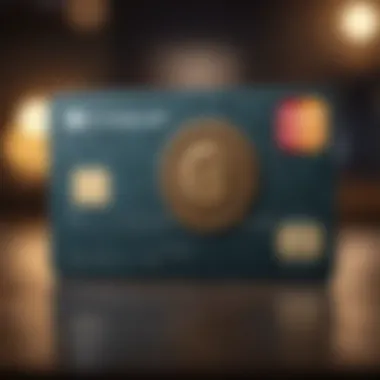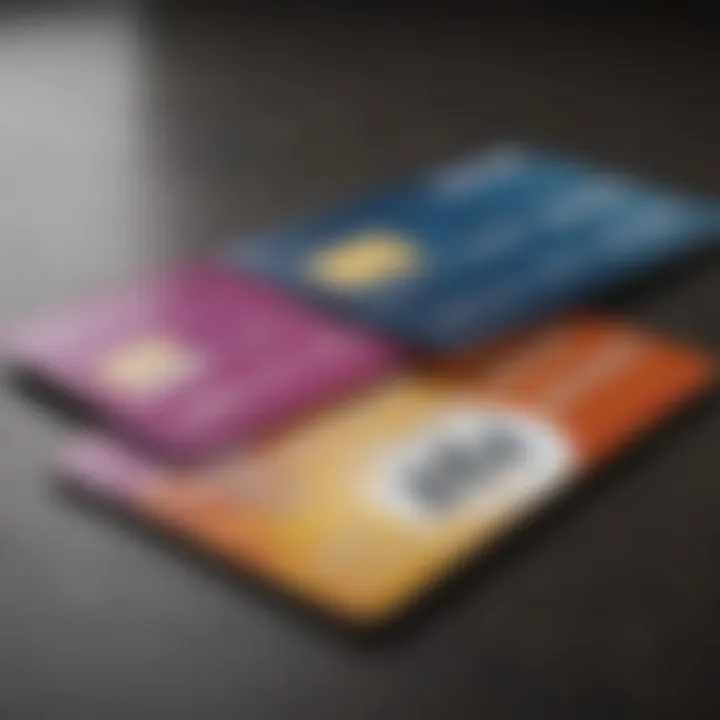Selecting the Best Debit Card for Global Travel


Intro
When it comes to traveling abroad, having the right tools in your financial kit can make a world of difference. Among those tools, a debit card stands out as a vital resource, allowing you to manage your expenses effortlessly in a foreign land. But, not all debit cards are crafted equally, especially when you consider the various fees, exchange rates, and security measures that can impact your experience. With an increasing number of travelers setting off for international adventures, the need for selecting the optimal debit card isn't just smart—it's essential.
In this guide, we will delve into the nitty-gritty of selecting a debit card for international use. We'll dissect the various characteristics that can make or break your travel experience. From the fees you might encounter to how currency conversion works, we aim to equip you with the knowledge necessary to navigate the financial landscape while abroad. Knowledge is power, and this piece seeks to empower you by shedding light on the vital features you need to consider before taking the plunge.
As we journey through this topic, special attention will be given to areas such as:
- The selection of debit cards with low or no foreign transaction fees
- Understanding how exchange rates can affect your spending power
- Evaluating security features, especially in light of an increase in digital fraud
With the right debit card in your pocket, navigating the financial waters of international travel can be a breeze. So let’s get started, diving into the terms and definitions that lay the groundwork for your decision-making process.
Understanding the Basics of Debit Cards
When you consider the choice of a debit card for international use, it is vital to grasp the fundamental aspects of what a debit card is and what it offers. By understanding these basic principles, travelers can navigate their financial options with greater confidence. Selecting the right debit card ultimately enhances your ability to manage expenses abroad, ensuring smoother transactions as you traverse new paths.
Definition and Purpose of Debit Cards
A debit card is essentially a financial instrument linked directly to the holder's bank account. Unlike a credit card, which allows you to borrow money up to a certain limit, a debit card draws funds directly from your available balance. This makes planning your spending a simpler exercise; if you don’t have it in your account, you can’t spend it. Debit cards serve multiple purposes—purchasing goods and services, withdrawing cash from ATMs, and even topping up mobile wallets, all with a swipe or tap.
In many ways, a debit card acts as an extension of your bank account and is intended for day-to-day expenditures and, in recent years, has also been adapted for international transactions. When traveling abroad, being equipped with a debit card can provide convenience for making purchases and accessing cash when needed. However, not all debit cards are created equal, especially when it comes to their usability across borders.
Advantages of Using Debit Cards Abroad
Using debit cards while traveling offers several advantages:
- Direct Access to Funds: Since the money is drawn from your own account, the chance of incurring debt is minimized.
- Enhanced Security: Modern debit cards often have built-in security features that protect users in case of theft or fraud.
- Convenience: Having a debit card allows you to withdraw cash from ATMs, making it easier to handle expenses in local currency.
- Low Transaction Fees: In many cases, you may avoid high international transaction fees that come with credit cards.
Moreover, using a debit card can aid in budgeting. You can only spend what you have, limiting the impulse to overspend and being caught unawares when the bill arrives.
Limitations of Debit Cards When Traveling
There are, however, some drawbacks to watch out for when using debit cards internationally:
- Foreign Transaction Fees: Some banks impose fees for transactions made in foreign currencies, which can add up quickly.
- ATM Withdrawal Limits: Debit cards often have lower withdrawal limits compared to credit cards. This can be troublesome in countries where larger cash amounts are necessary for certain transactions.
- Access Issues: Not all debit cards are widely accepted everywhere. Some places may mainly accept credit cards, leaving travelers in a bind.
- Risk of Blocking: Banks sometimes place holds on accounts if they detect foreign transactions, causing potential disruptions to your access.
"Understanding the pros and cons of using debit cards can empower international travelers to make informed decisions that fit their finance strategies."
Key Features to Consider
When selecting a debit card for international use, understanding the key features is paramount. Each card comes with a different set of benefits and limitations that can significantly impact your travel experience. This section will delve into aspects like foreign transaction fees, currency conversion rates, and ATM withdrawal limits that can affect your finances while abroad.
Foreign Transaction Fees and Charges
Foreign transaction fees can sneak up on travelers like a thief in the night. These fees are often tacked onto purchases made outside your home country, and they're generally around 1% to 3% of the transaction amount. One might think, "Well, it's just a few bucks," but when you're enjoying a lovely dinner in Paris or grabbing souvenirs in Tokyo, those extra charges can add up quickly. Here are a few things to consider:
- Card Selection: Not all debit cards charge these fees. Some financial institutions, especially those targeting travelers, offer cards with zero foreign transaction fees. Do your homework and see which banks play ball.
- Local Currency Preference: It’s often better to choose to be billed in the local currency, even though some merchants might offer to charge in your home currency. This is known as Dynamic Currency Conversion, and it's usually a money pit.
Currency Conversion Rates


The currency conversion rate is another critical factor to keep an eye on when traveling. This rate determines how much of the local currency you’ll receive when you make transactions abroad. Here’s the nitty-gritty:
- Global Market Rates: Financial institutions may not always offer the best rates, leading to converted payments costing more than expected. They don't always play fair, so shop around. You might be surprised to find which cards give a better deal.
- Watch for Markups: Some banks add a markup on the conversion rate. A rate of 1% here may seem insignificant, but multiply that by a couple of thousand spent over your trip, and you could be looking at significant losses.
ATM Withdrawal Limits and Fees
When it comes to using your debit card at ATMs abroad, knowing the withdrawal limits and associated fees is crucial. Best be prepared so that you don't end up stranded without cash.
Most banks set a daily withdrawal limit when you're overseas that could range from a few hundred to a thousand dollars. Here are a couple of considerations regarding ATM transactions:
- ATM Fees: Besides potential fees from your own bank, the ATM operator might levy its own fees as well. Using an ATM from a foreign bank might cost you an additional fee on top of what's already slapped on from your own bank.
- Limitations: If you're planning a big splurge or you're in a country where card payments aren't widely accepted, you may find yourself limited by the amount you can withdraw in a day. It's a good idea to plan ahead and potentially know where to find ATM networks that align with your card provider for lesser fees.
Knowing these key features before you jet off can save you dollars that are better spent on travel experiences rather than banking fees.
Security Considerations
When traveling abroad, security should be a top concern for anyone using a debit card. An ill-fated encounter with fraud, loss, or scams can quickly sidetrack a dreamy getaway. Knowing how to protect oneself can provide not only peace of mind but also financial safety while exploring new destinations. Consequently, discussing security measures associated with debit cards isn't just relevant; it's essential.
Fraud Protection Measures
The landscape of international finance is riddled with potential pitfalls, particularly when it comes to unauthorized transactions. Therefore, robust fraud protection measures must be a priority. Many banks offer system alerts either through text messages or email, notifying users of transactions made with their card. This is a simple yet effective way to keep an eye on spending and to quickly spot any suspicious activities.
However, it’s crucial to assess the fine print of your chosen debit card. Some cards might provide better coverage against fraud losses, allowing users to recover their money quicker than others. It’s advisable to look for cards that offer zero liability policies. This means if a transaction is made without consent, the user won’t be held responsible for those lost funds.
"In today's digital age, staying ahead of fraudsters requires vigilance, but being well-prepared can turn the tide in your favor."
EMV Chip Technology vs. Magnetic Stripes
As technology evolves, so do the methods employed by fraudsters. Many debit cards still use magnetic stripes, which are relatively easy to clone. EMV (Europay, Mastercard, and Visa) chip technology, on the other hand, provides an extra layer of security. Each transaction made with an EMV card generates a unique transaction code, making it challenging to replicate or forge.
In various parts of the world, EMV-enabled devices have become the norm, especially in places like Europe. Travelers are encouraged to switch to a debit card that features an embedded EMV chip, as it significantly reduces the risk of unauthorized transactions, particularly at point-of-sale terminals. Plus, carrying a chip card can enhance your acceptance in foreign establishments that may be wary of magnetic stripe-only cards.
Best Practices for Safe Usage Abroad
While having a safe debit card is essential, how one uses that card can greatly influence overall security. Here are some best practices for ensuring a smooth experience abroad:
- Notify Your Bank: Before embarking on your trip, inform your bank of your travel plans. This helps in avoiding any unexpected freezes on your card due to unusual activity.
- Use ATMs Wisely: Opt for ATMs that are located within bank branches rather than those on the street. It minimizes the risk of tampering.
- Set Spending Limits: Some banks allow you to set limits on your spending or ATM withdrawals. This can protect your funds in case your card is lost or stolen.
- Install Security Apps: Consider using security apps that monitor your account activity in real time. Many banks have their own apps that can alert users to any suspicious attempts.
By blending vigilance with best practices and an understanding of technology, travelers can significantly reduce their chances of encountering security issues abroad. Knowing these security considerations enables you to travel wiser and enjoy your international experiences without excessive worry.
Comparing Popular Debit Card Options
When it comes to selecting a debit card for international ventures, examining the various available options is essential. Different cards offer distinct features that may suit your needs better depending on where you’re headed or how you plan to spend. Making a well-informed choice can make all the difference in your travel experience.
Some cards shine a light on user convenience, while others may cater towards cost-effectiveness or security. Therefore, let's delve into three popular categories: Bank-Specific Debit Cards, Digital-First Debit Cards, and Prepaid Debit Cards for Travelers.
Bank-Specific Debit Cards
Benefits and Drawbacks
Bank-specific debit cards issued by traditional financial institutions can be a double-edged sword.
On one hand, they might offer numerous perks tied to your primary bank account, such as low transaction fees or the ability to access your account with ease. For example, customers with accounts at Wells Fargo might find their debit card provides fee waivers on ATM withdrawals at their network of ATMs abroad.
On the flip side, these cards may incur hefty foreign transaction fees if they don't cater to international usage adequately. Additionally, banks often impose daily withdrawal limits that might leave you in a tight spot while traveling. Overall, while they can be a good choice if they align with your banking habits, it's important to consider their international limitations carefully.


Examples of Leading Banks
For travelers wanting the traditional approach, examining which banks offer favorable cards for overseas use is critical. Banks like Chase and Citibank have built a reputation for providing global access to their debit card holders with various benefits.
Chase's debit card allows for fee-free transactions at numerous ATMs worldwide. On the other hand, Citibank customers benefit from their extensive ATM network in major cities around the globe. However, it's worthwhile to note that even with benefits, there can be pitfalls, such as aging fees that aren’t always clear upon signup. This can be a turn-off for potential users looking for complete transparency.
Digital-First Debit Cards
Emerging Technology Trends
Digital-first debit cards, like those offered by Chime and Monzo, are at the cutting edge of financial technology. They prioritize user experience with real-time notifications and streamlined banking services. Many of these cards make it easy to track spending habits, which is particularly useful when managing a budget abroad.
Moreover, these cards often come equipped with low to zero foreign transaction fees, making them more appealing for international travel. However, one must consider aspects such as the lack of physical branches and potential tech-related vulnerabilities
User Experience Insights
User experience can be a bread and butter factor when traveling. Digital-first cards tend to focus on what benefits the user most, offering features such as budget tracking tools and instant alerts about transactions. Consequently, this can provide peace of mind that might not be present with traditional debit cards.
However, relying solely on these might not be the best move for everyone. Customers might experience hiccups if the app is down or they face issues with online banking, leading to frustration while trying to access funds when they need them most. Also, some places still don't embrace contactless payments or apps, which could limit usability.
Prepaid Debit Cards for Travelers
Pros and Cons
Prepaid debit cards can be a lifesaver, especially for those who prefer not to carry large sums of cash. The primary benefit is their flexibility; since you load the card with money upfront, you can limit your spending to that amount. This works wonders for budget travelers mindful about their expenses, as it forces them to plan.
Nevertheless, they are not without their cracks. Some prepaid cards can come with steep activation fees, and there might be limitations on how or where they can be used. Additionally, the funds cannot be replaced if lost or stolen, unlike standard debit cards linked to bank accounts.
Recommended Providers
If you're considering a prepaid card, providers like Revolut and Wise have garnered positive feedback, especially among globetrotters. These cards offer competitive exchange rates and low withdrawal fees, making them practical choices for international use. However, potential users should read the fine print, as there may be hidden fees related to loading funds or using ATMs outside of the partner network.
"Understanding the nuances of the card you choose while traveling can save you a lot of time, hassle, and most importantly, money."
Selecting a debit card is not just about having a means to pay; it’s about ensuring your financial comfort and safety while exploring the globe. Take your time to weigh these options in light of your personal travel habits since the right debit card can turn a good trip into a great one.
Additional Benefits to Look For
When venturing abroad, travelers often focus on the basic functionality of their chosen debit card. While aspects like fees and withdrawal limits are crucial, there are additional benefits that can make a world of difference during your travels. These added features might not be front and center in promotional materials, yet they can greatly enhance your overall experience. Understanding these benefits can empower you to choose a debit card that not only suits your needs but also offers protection and perks.
Rewards Programs and Cashback Offers
Many banks today offer reward programs linked to their debit cards. These programs can be a welcomed bonus, particularly for those who frequently travel or make daily purchases. You might encounter a variety of rewards based on your spending habits, such as earning points for travel, dining, or shopping. These points can then be redeemed for discounts, merchandise, or even cashback on purchases.
However, it is important to check the fine print. Not all reward systems are created equal. Some may impose considerable restrictions on where and how you can earn and redeem these points. For instance, you might find that certain transactions or foreign currencies don't count towards rewards. If you play your cards right, you could turn those everyday expenses during your travels into something more meaningful.
- Types of Rewards: Look for these common type of rewards when selecting a debit card:
- Travel points for flights and hotels
- Cashback on specific categories like groceries or gas
- Discounts for popular retailers or services
In short, rewards programs can enhance your travel experience, providing tangible benefits that can offset some costs. However, always evaluate their applicability to your spending habits to avoid any disappointment.
Travel Insurance and Emergency Services
Another significant benefit to look for is travel insurance. Some debit cards come with complimentary travel coverage, which can provide peace of mind. This insurance might cover things like trip cancellation, lost luggage, or even medical emergencies abroad. It’s crucial to dive into the details. Policies vary widely; the level of coverage and included benefits can depend on various factors—from the card issuer to the specific plan.
Additionally, emergency services can be a lifesaver when you’re far from home. Many debit cards offer 24/7 assistance for issues like lost or stolen cards. This service often includes not just the ability to freeze your card but also the option of getting immediate cash advances or having a replacement card sent to your location.
Before selecting a card, consider:


- What is covered under the travel insurance?
- Are there limits on reimbursement?
- Is assistance available in multiple languages?
Understanding these factors ensures you’re not left high and dry during your travels. It’s more than a convenience; it’s about safeguarding yourself while enjoying the journey.
"A well-chosen debit card is like a well-packed suitcase; it may not seem important until you truly need something that’s tucked away inside."
In sum, while the primary features of debit cards are essential, don’t underestimate the value of additional benefits like rewards programs and travel insurance. They can significantly influence your travel experience, transforming daunting situations into manageable ones.
Recommendations Based on Use Cases
When it comes to choosing a debit card for international use, understanding your specific travel habits is crucial. Not all travelers have the same needs; therefore, tailoring your card selection to your travel patterns can make a significant difference in your overall experience. Identifying whether you’re a frequent traveler or an occasional one, and understanding the environments you’ll find yourself in – be it developed or developing countries – helps streamline your options and avoid unnecessary costs.
Frequent Travelers vs. Occasional Travelers
Frequent travelers typically have different preconditions compared to those who travel rarely. If you find yourself hopping from country to country multiple times a year, it’s wise to consider a debit card that minimizes fees and optimizes convenience.
Key Considerations for Frequent Travelers:
- No Foreign Transaction Fees: Frequent travelers should seek out cards that offer zero or minimal foreign transaction fees, as these charges can quickly add up during several trips.
- Global Acceptance: Opt for a debit card that is widely accepted in numerous countries, particularly if you travel to various destinations. Cards associated with major payment networks like Visa or Mastercard can provide extensive reach.
- Emergency Services: Look for cards providing reliable customer support, especially if you need help while abroad; knowing that you can speak with someone in your own language can be comforting.
For occasional travelers, the needs shift slightly. It’s likely you’re planning a few trips each year, enough to warrant some planning, but not frequent enough to justify premium services. Here’s what to keep in mind:
Key Considerations for Occasional Travelers:
- Simplicity of Use: Look for cards that are straightforward and easy to use, perhaps with basic features and no-frills processing. The last thing an occasional traveler needs is to wrestle with an overly complicated account.
- Basic Insurance Benefits: This category of travelers might benefit from debit cards that include basic travel insurance or emergency services as a part of the package.
- Limited Spending Fees: Since usage might be less frequent, negotiating low spending fees is essential. Ensure the card has friendly terms even for those rare but important occasions.
Traveling in Developed vs. Developing Countries
The type of country you’re heading to also influences your choice of debit card. Developed nations often have well-established banking systems that can accommodate various card types. However, there are still considerations, as some travelers can run into limitations in certain areas.
- For Developed Countries:
- For Developing Countries:
- Broad Acceptance: Again, focus on cards with heavy global recognition. While moments of writing a check in Japan might be rare, even credit cards tend to be accepted at many places.
- ATM Networks: Look for banks that are part of a robust international ATM network, as this may save on withdrawal fees.
- Cash Accessibility: In many developing nations, cash remains king. Having a debit card linked to a globally recognized ATM network becomes highly advantageous. Keep in mind, having cash handy for smaller transactions is most practical.
- Exchange Rates and Fees: Be wary of cards that charge exorbitant fees or unfavorable exchange rates; doing your homework can save you a pretty penny compared to using a local ATM.
"When traveling internationally, finding the right debit card is like choosing the right tool for a job; the wrong one can make the task harder than it needs to be."
Final Thoughts on Selecting a Debit Card
Choosing the right debit card for international use isn't as straightforward as picking the first one that glimmers in the light of an advertisement. It's a thoughtful process that can ultimately save you money and bring peace of mind during your travels. The final section underscores the importance of introspection—knowing yourself and how you plan to use this financial tool will guide your choices.
Evaluating Personal Needs and Preferences
When it comes to travel, everyone has their own unique rhythm. Some folks are frequent flyers, hopping from city to city, while others may find themselves on a yearly excursion to unwind. Evaluating your personal needs starts here. Ask yourself:
- How often do I travel? If you’re jet-setting multiple times a year, a card with low foreign transaction fees may come in handy.
- What regions do I visit? Each locale has distinct banking laws, fees, and ATM availability. Knowing this can guide you toward a card tailored to your destination.
- What is my budget? If you’re a careful spender, cards with cashback rewards might make your experience even sweeter. Alternatively, if you often spend without a second thought, a prepaid option might prevent accidental overspending.
Pair these considerations with any inherent preferences. For instance, do you feel more comfortable transacting in cash, or are you alright with digital payments? Knowing where you stand will give you a solid framework for selecting the most suitable debit card.
Future Trends in Travel Finance
The world of travel finance is not a stagnant pool—it's constantly evolving. As technology quickly advances, we’re witnessing changes that could reshape the way we use our debit cards abroad. Upcoming trends include:
- Contactless Payments: More and more international locations are embracing this kind of payment, making it simpler to swipe your card with a quick wave. Offering both security and convenience, this could soon become the standard.
- Cryptocurrency Integration: Although still in its infancy, the integration of digital currencies into financial services might offer a new frontier for travelers seeking flexibility. Imagine using Bitcoin at a cafe in Paris—possible, but not quite mainstream yet.
- Enhanced Security Features: As digital fraud hovers, expect advancements in biometric and AI technologies to protect your spending. Fingerprint and facial recognition are becoming more common, allowing seamless transactions without risking your information.
As we conclude this exploration into finding the right debit card, keep in mind that your choices today can have significant implications for your future travel experiences. Whether you're a carefree wanderer or a meticulous planner, there’s a perfect card waiting to be discovered, tailored just for you.







